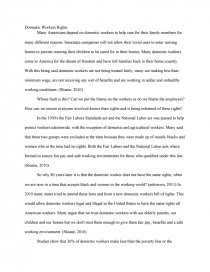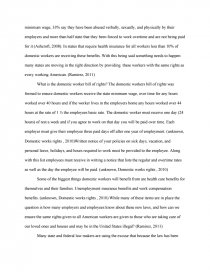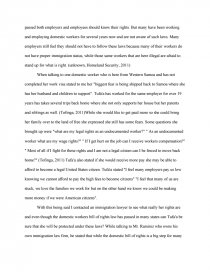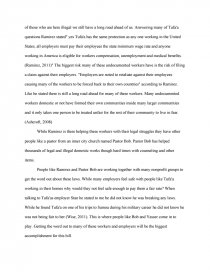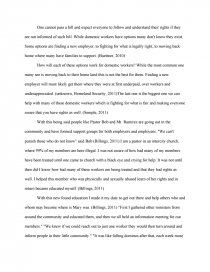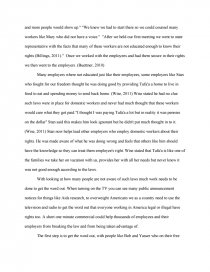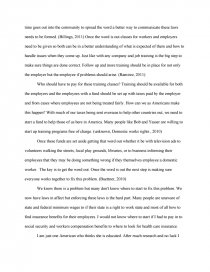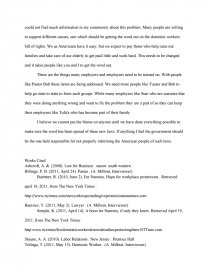Domestic Workers Rights
Essay by Woxman • December 1, 2011 • Term Paper • 2,856 Words (12 Pages) • 1,967 Views
Domestic Workers Rights
Many Americans depend on domestic workers to help care for their family members for many different reasons. Insurance companies will not allow their loved ones to enter nursing homes to parents wanting their children to be cared for in their homes. Many domestic workers come to America for the dream of freedom and have left families back in their home country. With this being said domestic workers are not being treated fairly, many are making less than minimum wage, are not receiving any sort of benefits and are working in unfair and unhealthy working conditions. (Sloane, 2010)
Whose fault is this? Can we put the blame on the workers or do we blame the employers? How can we ensure everyone involved knows their rights and is being informed of these rights?
In the 1930's the Fair Labors Standards act and the National Labor act was passed to help protect workers nationwide, with the exception of domestic and agricultural workers. Many said that these two groups were excluded at the time because they were made up of mainly blacks and women who at the time had no rights. Both the Fair Labors and the National Labor acts where formed to ensure fair pay and safe working environments for those who qualified under this law. (Sloane, 2010)
So why 80 years later it is that the domestic worker does not have the same rights, when we are now in a time that accepts black and women in the working world? (unknown, 2011) In 2010 many states tried to amend these laws and form a new domestic workers bill of rights. This would allow domestic workers legal and illegal to the United States to have the same rights all American workers. Many argue that we trust domestic workers with our elderly parents, our children and our homes but we don't trust them enough to give them fair pay, benefits and a safe working environment. (Sloane, 2010)
Studies show that 26% of domestic workers make less than the poverty line or the minimum wage, 33% say they have been abused verbally, sexually, and physically by their employers and more than half state that they been forced to work overtime and are not being paid for it (Ashcroft, 2008). In states that require health insurance for all workers less than 10% of domestic workers are receiving these benefits. With this being said something needs to happen many states are moving in the right direction by providing these workers with the same rights as every working American. (Ramirez, 2011)
What is the domestic worker bill of rights? The domestic workers bill of rights was formed to ensure domestic workers receive the state minimum wage, over time for any hours worked over 40 hours and if the worker lives in the employers home any hours worked over 44 hours at the rate of 1 ½ the employees basic rate. The domestic worker must receive one day (24 hours) of rest a week and if you agree to work on that day you will be paid over time. Each employer must give their employee three paid days off after one year of employment. (unknown, Domestic works rights , 2010)Written notice of your policies on sick days, vacation, and personal leave, holidays, and hours required to work must be provided to the employee. Along with this list employees must receive in writing a notice that lists the regular and overtime rates as well as the day the employee will be paid. (unknown, Domestic works rights , 2010)
Some of the biggest things domestic workers will benefit from are health care benefits for themselves and their families. Unemployment insurance benefits and work compensation benefits. (unknown, Domestic works rights , 2010) While many of these items are in place the question is how many employers and employees know about these new laws, and how can we ensure the same rights given to all American workers are given to those who are taking care of our loved ones and houses and may be in the United States illegal? (Ramirez, 2011)
Many state and federal law makers are using the excuse that because the law has been passed both employers and employees should know their rights. But many have been working and employing domestic workers for several years now and are not aware of such laws. Many employers still feel they should not have to follow these laws because many of their workers do not have proper immigration status, while those same workers that are here illegal are afraid to stand up for what is right. (unknown, Homeland Security, 2011)
When talking to one domestic worker who is here from Western Samoa and has not completed her work visa stated to me her "biggest fear is being shipped back to Samoa where she has her husband and children to support". Tufa'a has worked for the same employer for over 19 years has takes several trips back home where she not only supports her house but her parents and siblings as well. (Tofinga, 2011)While she would like to get paid more so she could bring her family over to the land of free she expressed she still has some fears. Some questions she brought up were "what are my legal rights as an undocumented worker?" " As an undocumented worker what are my wage rights?" " If I get hurt on the job can I receive workers compensation?" " Most of all if I fight for these rights and I am not a legal citizen can I be forced to move back home?" (Tofinga, 2011) Tufa'a also stated if she would receive more pay she may be able to afford to become a legal United States citizen. Tufa'a stated "I feel many employers pay us low knowing we cannot afford to pay the high fees to become citizens" "I feel that many of us are stuck, we love the families we work for but on the other hand we know we could be making more money if we were American citizens".
With this being said I contacted an immigration lawyer to see what really her rights are and even though the domestic workers bill of rights law has passed in many states can Tufa'a be sure that she will be protected under these laws? While talking to Mr. Ramirez who owns his own immigration law firm, he stated that while the domestic bill of rights is a big step for many of those who are here illegal we still have a long road ahead of us. Answering many of Tufa'a questions Ramirez stated" yes Tufa'a has the same protection as any one working in the United States, all employers must pay their employees the state minimum wage rate and anyone working in America is eligible for workers compensation, unemployment and medical benefits. (Ramirez, 2011)" The biggest risk many of these undocumented workers have is the risk of filing a claim against their employers. "Employers are noted to retaliate against their employees causing many of the workers to be forced back to their own countries" according to Ramirez. Like he stated there is still a long road ahead for
...
...
